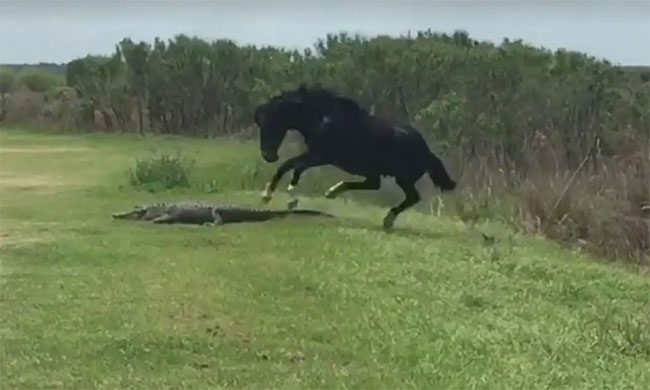A Wild Horse’s Foolhardy Charge at a Crocodile
In the wild, we often witness predatory species like lions and crocodiles actively attacking animals such as antelopes and zebras. However, a rare video captured by tourists at Florida State Park (USA) showcases an astonishing scene where a wild horse dares to attack a crocodile.
The video reveals a crocodile lounging in the sun on the grass while a herd of horses nearby seems completely unfazed by the cold-blooded predator in their midst.
Suddenly, a male horse goes wild, charging at the crocodile and attempting to stomp on the predator with its hooves. The unexpected attack catches the crocodile off guard.
However, as the horse begins to run in circles and charges again, the crocodile decides to retaliate with a powerful bite. The force of the attack lifts the crocodile off the ground.
Fortunately, the crocodile misses its target, allowing the wild horse to escape narrowly. After the attack, the horse seems to realize the danger and retreats back to its herd. Witnesses to the incident were left astonished and worried for both animals.

The horse narrowly avoided being bitten by the crocodile as it charged. (Image taken from the clip).
According to documented studies, crocodiles are among the animals with the most powerful bites on our planet.
It is estimated that the bite force of an adult saltwater crocodile can reach up to 3,700 PSI, equivalent to 260 kg/cm2. In comparison, the strongest bite force belongs to the great white shark, at around 4,000 PSI.
Although they are relatively lazy reptiles, crocodiles can be extremely agile when hunting or provoked, capable of tearing apart large prey such as buffalo, cattle, horses, and even humans in an instant.
Typically, after delivering a powerful bite, a crocodile will drag its victim into the water to drown it. Then, to tear apart its prey, the crocodile firmly grips the meat and spins several times to rip it away.
This incident shows that the wild horse in the clip was indeed fortunate to escape the crocodile’s bite, preserving its life against the cold-blooded predator lurking in the water.


















































